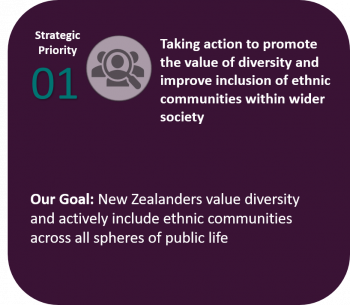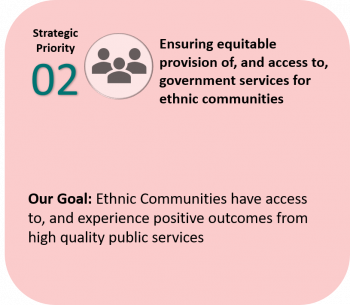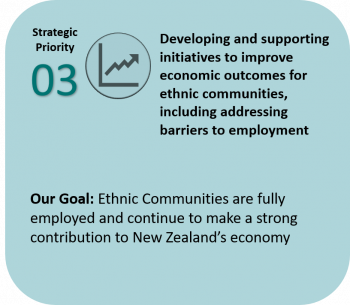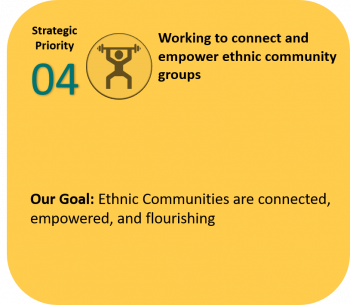Transcript
We are developing a new strategy and we need your help. Below you will find how you can get involved.
We asked ethnic communities what our priorities should be
Ethnic voices are driving where we put our effort and that is how it should be.
Over the years, communities have been sharing with us their aspirations and needs.
Communities want to see an inclusive New Zealand where everyone can flourish, regardless of their background. They want to live in a society free of racism and discrimination.
Earlier this year, when we were setting up the Ministry, we called on people from across our communities again to help us identify what we should prioritise in the next few years.
We heard what really matters. The Government agreed four strategic priorities that reflect the communities’ aspirations which we will focus on in the next few years.
 |
 |
 |
 |
Based on what people told us, we agreed to prioritise work that would help achieve the following goals to lift the wellbeing of ethnic communities:
- New Zealanders value diversity and actively include ethnic communities across all spheres of public life;
- Ethnic communities have access to, and experience positive outcomes from high quality government services;
- Ethnic communities are fully employed, and continue to make strong contributions to the New Zealand economy; and
- Ethnic communities are empowered and supported to flourish in New Zealand.
We now want to share our draft Ministry strategy – to make sure we have got it right
Now that our priorities are set, the next step has been to create a roadmap of actions.
We have drafted a strategy for the Ministry that focuses on the ‘how’. It includes the actions we propose to take to achieve our goals and many of the actions are what people told us would make a real difference.
We really value your feedback on our proposals and want to check that we’ve got it right. We want to make sure that your voice continues to shape our work.
We also welcome feedback from anyone with an interest to lift the wellbeing of ethnic communities, including those who deliver services and support for ethnic communities.
Check out the Ministry's draft Strategy in word or PDF.
How to provide feedback
We are seeking feedback on the draft strategy between Monday, 27 September and Friday, 5 November 2021.
We are asking for feedback through online targeted focus group engagements and an online survey. The survey provides an opportunity for more people to provide feedback from where they are, and when they can between now and November.
You can also provide your feedback or ask questions about this engagement via email at: info@ethniccommunities.govt.nz
If you would like to provide your feedback during a zoom session, please see details below and RSVP through info@ethniccommunities.govt.nz. Once you have registered we will send you a zoom link. We encourage you to read the draft strategy prior to attending the session so that we can fully engage in the conversation about how to improve the strategy.
| Date | Time |
| Monday 11 October | 12:00pm - 1:30pm |
| Thursday 21 October |
12:00pm - 1:30pm 6:00pm - 7:30pm |
| Tuesday 26 October |
12:30pm - 2:00pm 5:00pm - 6:30pm 6:00pm - 7:30pm |
| Wednesday 27 October |
9:30am - 11:00am 6:00pm - 7:30pm |
| Thursday 28 October | 6:00pm - 7:30pm |
| Friday 29 October | 12:30pm - 2:00pm |
| Saturday 30 October | 12:30pm - 2:00pm |
| Monday 1 November | 6:00pm - 7:30pm |
| Tuesday 2 November | 6:00pm - 7:30pm |
| Thursday 4 November | 6:00pm - 7:30pm |
We would love to hear from you. The more perspectives we have the better job we will do.
Your voice: Feedback on the draft Employment Action Plan
The Minister for Diversity, Inclusion and Ethnic Communities will also soon be consulting on the Former Refugees, Recent Migrants and Ethnic Communities draft Employment Action Plan. The Employment Action Plan is one of the actions in this strategy. Further details will be available on our website shortly.
Protecting your information
The Privacy Act 2020 governs how the Ministry collects, holds, uses, and discloses personal information about you and the information you provide. The information shared through this process will only be used to revise the Ministry’s strategy and inform our work programme.
Your feedback may be subject to a request to the Ministry for Ethnic Communities for information under the Official Information Act 1982. Personal details can be withheld under the Act, including your name and address. If you do not want any information you provide to be released, please let us know. For example, you may wish for some information to be confidential because it is sensitive personal information. The Ministry for Ethnic Communities will take your views into account when responding to such requests.
Transcript
Tēnā koutou katoa
I am Mervin Singham the Chief Executive of the Ministry for Ethnic Communities.
I have always believed that one of the most precious rights we have is the ability to use our voice to shape our own lives and the future of our country.
Earlier this year we asked people to use their voice, we asked people across the country to tell us what they thought the most important priorities for the soon to be Ministry for Ethnic Communities should be, and ethnic people across the country told us many things.
We listened to what they said, and we consolidated everything that people told us into four priorities.
The first one is that New Zealanders recognise the value of ethnic diversity and include ethnic people in all spheres of public life.
The second priority is that ethnic people have a high-quality experience when they are accessing government services. People want culturally appropriate and equitable services when they come to government.
The third thing that people wanted is that they are meaningfully employed and that they are able to continue to make valuable contribution to the New Zealand economy.
And the fourth priority is that people wanted to be connected and empowered and supported to thrive and flourish as ethnic people in our country.
These four compelling priorities were provided to cabinet and those became the priorities for the new Ministry for Ethnic Communities.
During our conversations during the consultation and before, many people also told us the actions they thought we should take to make those priorities come alive.
We have now pulled everything together into a strategy and plan that we would like to come back and talk to you about. Have we got these things right? How can we make things happen in partnership with each other? So ethnic communities thrive and flourish in New Zealand to the benefit of all New Zealand.
We will be conducting an online survey with information on our website, we will tell you how to do that, so you can have your say if that is your preferred way of engaging with us.
We will also be having hui with people, where we will be having a conversation with ethnic community leaders and people who are working on the ground to make sure that your voice is heard, that you can work in partnership with us to shape the strategy and plan for the Ministry moving forward.
I thank you in advance for your participation. Please use your voice, support us to get it right for you.
Thank you.
No reira, tēnā koutou, tēnā koutou, tēnā koutou katoa.
